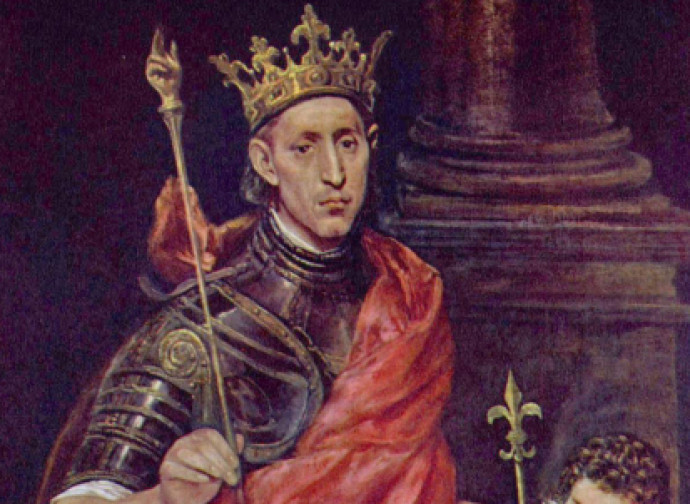Saint Louis (Louis IX)
Louis IX (1214-1270) was canonized in 1297. He was called by his contemporaries “the devout king” and went down in history as a just sovereign who was able to promote the artistic, cultural and economic development of France.

Louis IX (1214-1270) was canonized in 1297; he is also known as Louis the Saint or Louis of the French. He was called by his contemporaries “the devout king” and went down in history as a just sovereign who was able to promote the artistic, cultural and economic development of France. He was born in Poissy on 25 April from the marriage between Blanche of Castile (also venerated as a saint although never formally canonized) and Louis VIII. He received a solid Christian education. He grew up with such a lively faith that he called himself “Louis of Poissy”, not simply because of the custom of adding the place of origin to one’s proper name but because he knew he was reborn in Christ on the day of his Baptism in Poissy. His father died when he was twelve and he was therefore consecrated king. His mother Blanche assumed the regency, helping her son to guard and consolidate the kingdom through important military victories against the nobles who undermined him.
At the age of twenty he married Margaret of Provence. From this marriage - after two miscarriages - eleven children were born, four of whom did not survive him. After assuming direct power, Louis IX revealed great wisdom in governing. Though devoted and subject to the spiritual authority of the Church, he exercised regal authority when it came to temporal matters concerning the State. One example was the intricate dispute between him and the bishop-count of Beauvais, during which he elected the mayor by powers conferred by public law to put an end to the tumults that had long agitated the city. He was therefore very able to distinguish between true and false secularism, as is also shown by the inquiry he had performed by Dominicans and Franciscans to verify the conditions of government in his territories. That inquiry, from which emerged the injustices committed by royal agents against the population, was the premise for the moral renewal and administrative reorganization of the kingdom. He sought to bring the papacy and the empire closer together at the time of the turbulence of Frederick II of Swabia. He sent missionaries to the Mongols, then expanding, in a vain attempt to convert them.
In the meantime, he had ordered the construction of the splendid Sainte-Chapelle in order to guard worthily the Crown of thorns of Jesus and other relics of the Passion (the Holy Sponge, parts of the Cross and the Holy Lance), which he gradually bought from Baldwin II of Constantinople. In the procession that accompanied the Crown of Thorns to the cathedral of Sens, together with his brother Robert, wearing a tunic and barefoot, he personally carried the chest with the relic. In 1244 he fell seriously ill to the point of death. As soon as he regained consciousness and was able to speak, as his great friend and biographer Jean de Joinville tells us, he said he wanted to become a crusader. He wanted to free the Holy Land and ensure the safety of the pilgrims. He left four years later, at the head of the Seventh Crusade (1248-1254), conceiving it as did most of the Crusaders, i.e. as a penitential pilgrimage.
The scene of the clashes was Egypt, where the Muslims captured Louis. The king was more concerned for the other prisoners than for himself and refused any abjuration of his faith. He was freed after payment of a ransom and went to the Holy Land, where he spent another four years trying to revive the overseas lands. He returned to France after the death of his beloved mother, to whom he had entrusted the regency. As his confessor Godfrey de Beaulieu wrote, “His new way of life, brought from the Holy Land, surpassed in holiness his previous life”. He resumed the work of political and moral reform, always remembering to safeguard the rights of God. He took measures against blasphemy, gambling, prostitution, usury, immorality in taverns. He propagated the principle of the presumption of innocence for the accused. During this period the Sorbonne was founded by its chaplain Robert de Sorbon.
In 1267 he decided to undertake a new crusade, landing three years later in Tunis. Here dysentery first struck his son John Tristan and then the king himself, who died on 25 August 1270, assisted spiritually by Godfrey de Beaulieu. He left him these last words: “Let us try, for the love of God, to preach and introduce the Catholic faith in Tunis”. His confessor also reported that the saint gave up his soul to God at three o'clock in the afternoon, like Jesus, on a bed of “scattered ashes in the shape of a cross”.
Patron of: France, Franciscan Third Order
